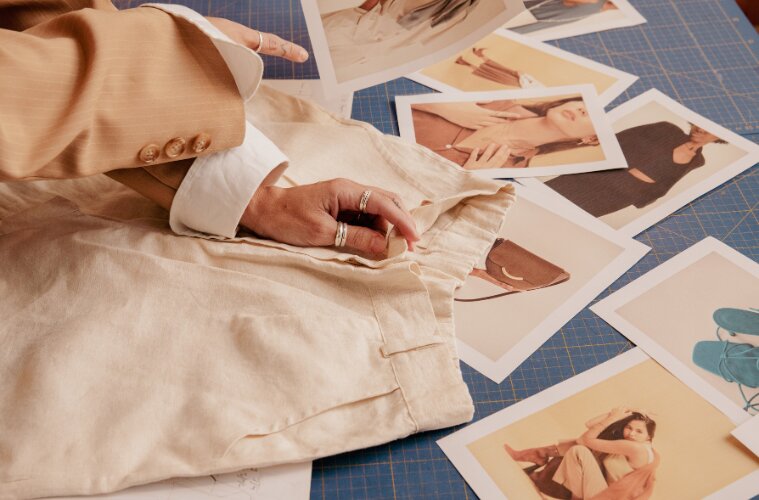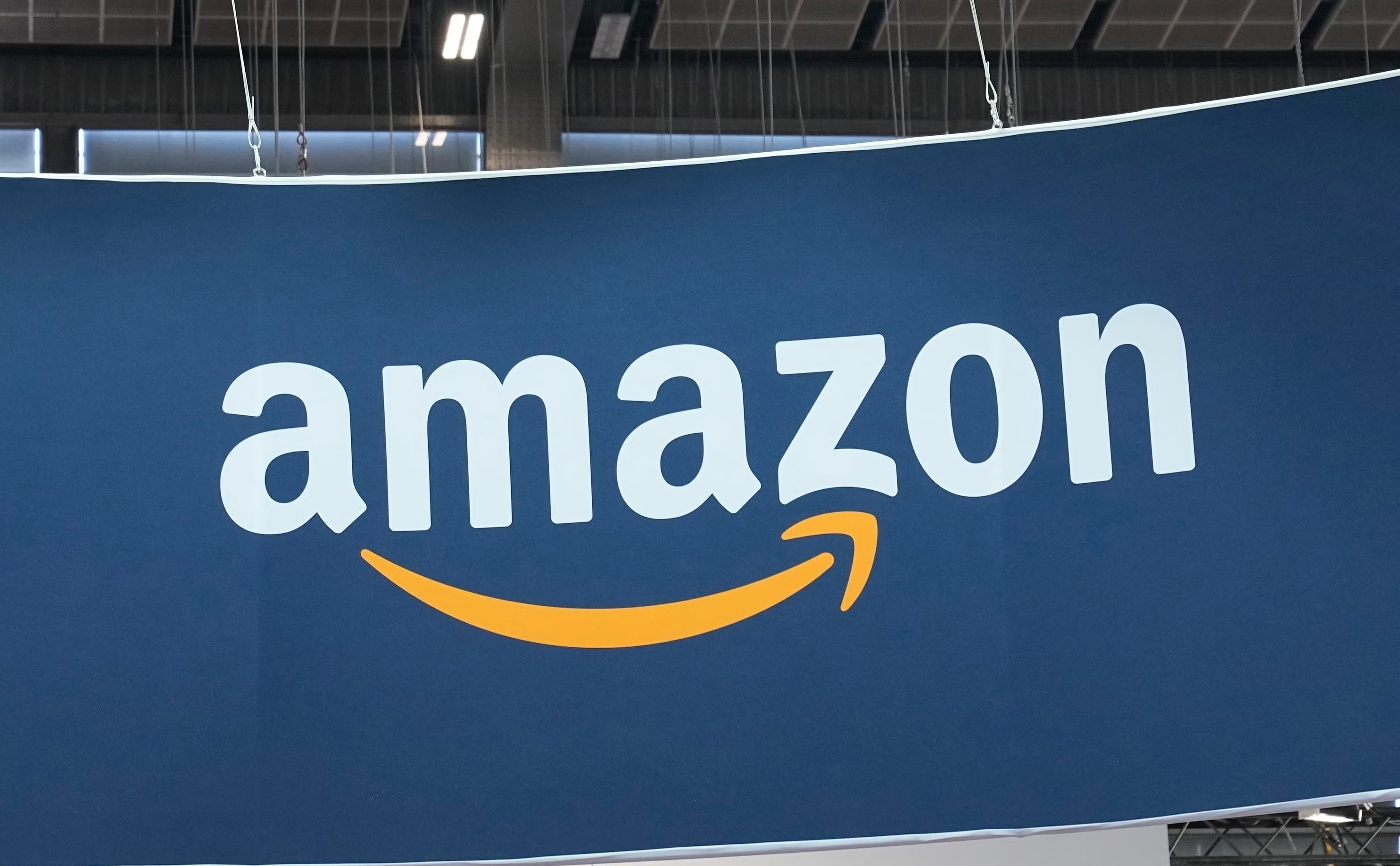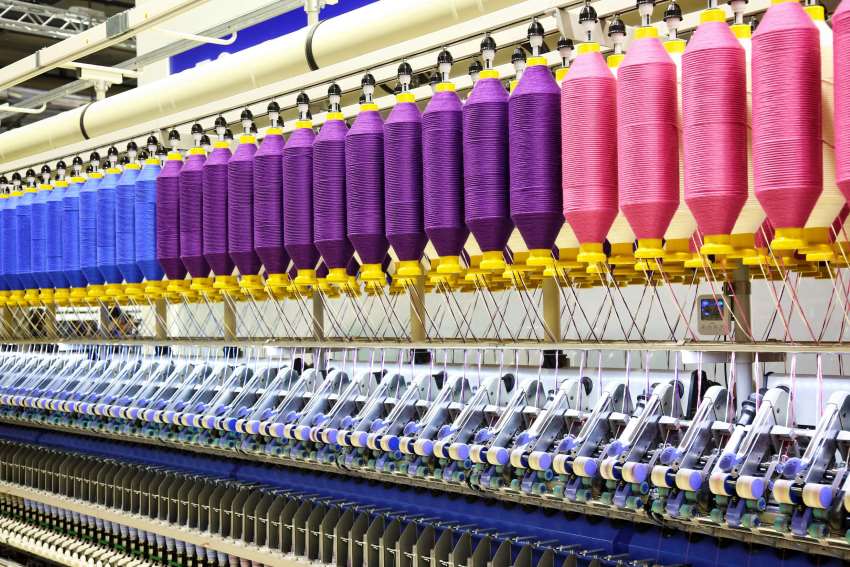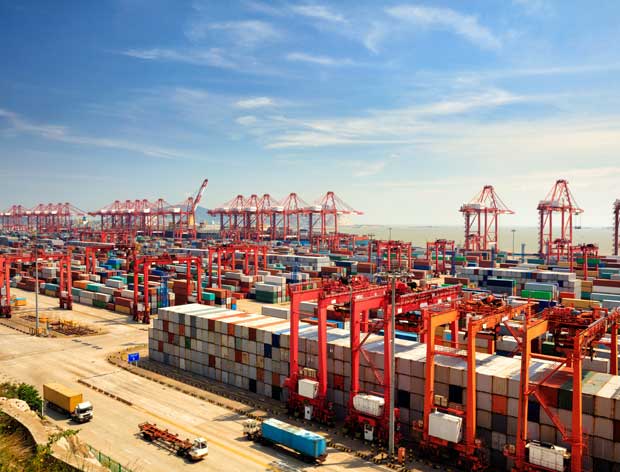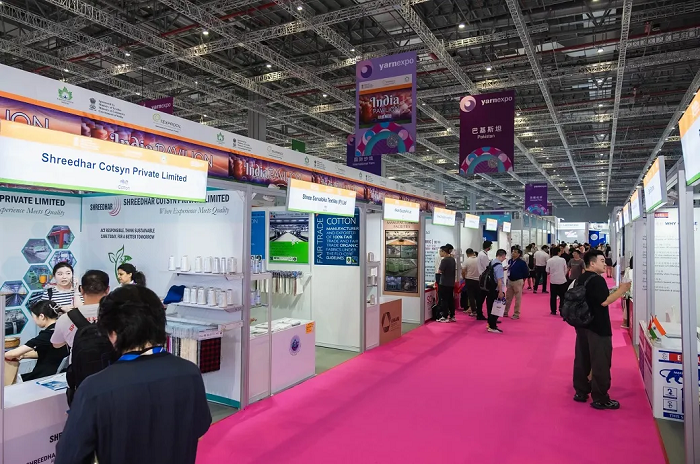FW
"India’s largest apparel trade show – The 67th National Garment Fair is being organised by the Clothing Manufacturers Association of India (CMAI) from July 16 to 19, 2018 at the Bombay Exhibition Centre, Goregaon. The fair will be inaugurated by Rahul Mehta, President, CMAI, who is also the ex-chairman of the International Apparel Federation (IAF). The B2B fair will be spread over approx 650,000 sq. ft. and will be attended by 986 exhibitors displaying 1,087 leading brands in menswear, women’s wear, kids wear and accessories. CMAI will also publish the ‘Show Directory’, popularly known as the Fair Guide."
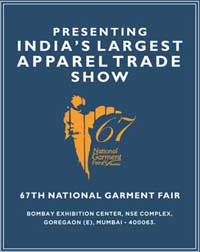 India’s largest apparel trade show – The 67th National Garment Fair is being organised by the Clothing Manufacturers Association of India (CMAI) from July 16 to 19, 2018 at the Bombay Exhibition Centre, Goregaon. The fair will be inaugurated by Rahul Mehta, President, CMAI, who is also the ex-chairman of the International Apparel Federation (IAF). The B2B fair will be spread over approx 650,000 sq. ft. and will be attended by 986 exhibitors displaying 1,087 leading brands in menswear, women’s wear, kids wear and accessories. CMAI will also publish the ‘Show Directory’, popularly known as the Fair Guide.
India’s largest apparel trade show – The 67th National Garment Fair is being organised by the Clothing Manufacturers Association of India (CMAI) from July 16 to 19, 2018 at the Bombay Exhibition Centre, Goregaon. The fair will be inaugurated by Rahul Mehta, President, CMAI, who is also the ex-chairman of the International Apparel Federation (IAF). The B2B fair will be spread over approx 650,000 sq. ft. and will be attended by 986 exhibitors displaying 1,087 leading brands in menswear, women’s wear, kids wear and accessories. CMAI will also publish the ‘Show Directory’, popularly known as the Fair Guide.
Domestic apparel market growth
Mehta points out domestic apparel market has grown at a CAGR of 10 per cent since 2005 and is estimated to worth $67 billion in 2017. The market, due to the presence of strong fundamentals, is expected to grow at CAGR of 11-12 per cent and reach about $160 billion by 2025. The segment is mainly dominated by the ready-to-wear category which makes up 84 per cent of the total market, amounting to $56 billion, growing at a CAGR of 10-11 per cent.
Meanwhile, the ready-to-stitch segment is also gaining momentum as men who earlier bought premium or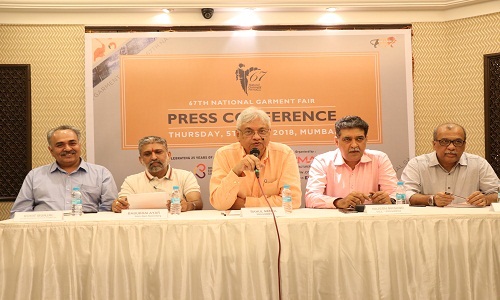 luxury readymade clothing brands are now opting for a shirt or a trouser that fits them perfectly. The ready-to-stitch market, is currently estimated at $11 billion and expected to grow at a CAGR of 7 per cent and reach about $20 billion in 2025.
luxury readymade clothing brands are now opting for a shirt or a trouser that fits them perfectly. The ready-to-stitch market, is currently estimated at $11 billion and expected to grow at a CAGR of 7 per cent and reach about $20 billion in 2025.
Declining exports a bug bear
Premal Udani, Chairman, Board of Trustees, CMAI observes apparel exports are declining since October 2017. The introduction of GST has resulted in non-refund of several embedded taxes. Consequently apparel exports for the financial year 2017-18, has declined 4 per cent to $16.7 billion. This downturn is continuing in FY 2018-19 with a month on month decline of 10 per cent. To counter this, the government has assured embedded taxes will be refunded through the drawback route.
"The Lenzing Group introduces Veocel, the company’s new nonwoven specialty brand. Positioned as a premium brand of nonwoven fibres for daily care rituals, Veocel provides the nonwoven industry with fibers that are certified clean and safe, biodegradable, from botanic origin and produced in an environmentally responsible production process. Offerings under the Veocel brand cover a broad range of applications for everyday use, from baby care, beauty and body care to intimate care and surface cleaning. Such applications are categorised under branded offers Veocel Beauty, Veocel Body, Veocel Intimate and Veocel Surface."
 The Lenzing Group introduces Veocel, the company’s new nonwoven specialty brand. Positioned as a premium brand of nonwoven fibres for daily care rituals, Veocel provides the nonwoven industry with fibers that are certified clean and safe, biodegradable, from botanic origin and produced in an environmentally responsible production process. Offerings under the Veocel brand cover a broad range of applications for everyday use, from baby care, beauty and body care to intimate care and surface cleaning. Such applications are categorised under branded offers Veocel Beauty, Veocel Body, Veocel Intimate and Veocel Surface.
The Lenzing Group introduces Veocel, the company’s new nonwoven specialty brand. Positioned as a premium brand of nonwoven fibres for daily care rituals, Veocel provides the nonwoven industry with fibers that are certified clean and safe, biodegradable, from botanic origin and produced in an environmentally responsible production process. Offerings under the Veocel brand cover a broad range of applications for everyday use, from baby care, beauty and body care to intimate care and surface cleaning. Such applications are categorised under branded offers Veocel Beauty, Veocel Body, Veocel Intimate and Veocel Surface.
Veocel is a key milestone in Lenzing’s new brand strategy to transform from a business-to-business (B2B) fibre producer to a business-to-business-to-consumer (B2B2C) brand. Coupled with ongoing co-branding, joint marketing and brand education initiatives conducted with customers and brands globally, Veocel will enable Lenzing to shift its focus beyond fibre types to product application and build a relatable and emotional connection with consumers.
Robert van de Kerkhof, Chief Commercial Officer, Lenzing Group explains, “Guided by our sCore Ten strategy, the launch of the Veocel brand will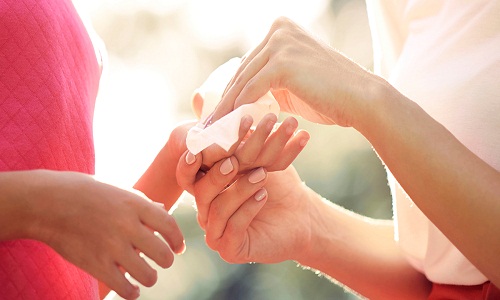 accelerate our migration into a specialty fibre business with a strong focus on innovation, quality and sustainability. Through ongoing proactive communication, the Veocel brand will also promote a holistic understanding about the benefits of botanic fibres in nonwoven products across the industry value chain and among consumers. This will not only help to maximise the marketing efforts of our customers and partners, but also drive dialogue about sustainability across the nonwoven industry. Through the Veocel brand, we hope to address the growing demand for transparency and sustainability across the value chain and provide consumers with greener product options.”
accelerate our migration into a specialty fibre business with a strong focus on innovation, quality and sustainability. Through ongoing proactive communication, the Veocel brand will also promote a holistic understanding about the benefits of botanic fibres in nonwoven products across the industry value chain and among consumers. This will not only help to maximise the marketing efforts of our customers and partners, but also drive dialogue about sustainability across the nonwoven industry. Through the Veocel brand, we hope to address the growing demand for transparency and sustainability across the value chain and provide consumers with greener product options.”
The USPs
The latest addition to the Veocel Surface brand – the Veocel Lyocell Fiber with ‘Quat’ Release technology, is a premium and specialty wood-based cellulose fibre used in hard surface cleaning and disinfectant wet wipes. Veocel Lyocell fibres with Lenzing’s Quat Release technology allow quaternary ammonium compounds, also known as ‘Quat’, to be released from wet wipes onto the surface for effective cleaning and disinfecting in household and industrial environments.
While the nonwoven industry has acknowledged the benefits of Lenzing’s cellulosic fibres, such as their sustainable nature, botanic origin and ability to improve cleaning experience, the majority of single-use cleaning and disinfectant wet wipes mainly consists of synthetic fibers such as polyester and polypropylene. This binding interaction substantially decreases the release of ‘Quat’ and can negatively impact the efficacy of the disinfectant product. However, with Lenzing’s ‘Quat’ Release technology, the binding of ‘Quat’ to the surface of Veocel Lyocell Fibres is significantly reduced, resulting in improved effectiveness of surface cleaning and the disinfection process. Wet wipes containing Veocel Lyocell Fibre with ‘Quat’ Release technology demonstrate significantly improved release of ‘Quat’ from the wet wipe to the surface, resulting in improved product stability and performance. In addition, Veocel Lyocell fibres also promote good absorbency, homogenous distribution of liquid in wet wipes and good hand feel.
“Following the introduction of Veocel, joint promotional programmes with retail brand partners will be rolled out to equip consumers with the knowledge they need to identify nonwoven products that combine advanced performance, comfort and sustainability. “With Veocel, we are building a consumer-focussed ingredient brand that proactively communicates with consumers through a B2Me approach, which is unique to the nonwoven industry. Given nonwoven products are in close contact with skin or other sensitive areas of the body, ongoing consumer outreach plays a critical role in building trust among consumers. Matched with a tagline ‘purely for you’, we wish to convey a Veocel brand promise that highlights our dedication to provide certified clean and safe products and pure care to consumers and the environment,” said Harold Weghorst, director – global brand management, Lenzing Group.
The 34th edition of IAF World Fashion Convention will be held in the Maastricht, Netherlands on October 9 and 10, 2018. The event caters to apparel industry leaders from across the supply chain, from all continents. The theme of the edition is Building a smart future for the fashion industry.
In a world where prices cannot drop much lower, boats cannot go much faster and people cannot work much harder, improvements are made only when the business is made smarter.
From smart supply chain collaboration to smart new machines, smart materials and above all, smart people, the convention will show many inspiring examples of a smarter apparel supply chain. Top speakers from across the globe cover the width of the supply chain, from raw materials to apparel sourcing and from production to retail trends. The convention provides an excellent opportunity to meet the global industry in one location in a few days’ time.
World Fashion Convention is organized by the International Apparel Federation. This is the only global federation of its kind representing apparel associations from 60 countries, representing over 1,50,000 companies. The co-organizer is Modint. This is the Dutch association for the fashion and textile industries. It has about 600 members who have a cumulative annual turnover of about nine billion euro.
Georgia and Hong Kong have signed a free trade agreement. The FTA was negotiated in 2016 and has several standard components, namely the elimination or reduction of tariffs, the liberalization of non-tariff barriers, flexibility regarding rules of origin to facilitate bilateral trade, customs facilitation procedures, liberalization and promotion and protection of investment, liberalization of trade in services, and a dispute settlement mechanism for the FTA.
The FTA has strategic value for Hong Kong and will help expand Hong Kong’s FTA network into the respective regions including Eurasia. The agreement is Hong Kong’s first with a country in the Caucasus region.
Georgia is the city's 121st trading partner in terms of goods. The signing is a part of Hong Kong’s long-term strategy of expanding its global reach as it moves toward being an international trading center. In the past 12 months, the city has secured three sets of FTAs, including the one with Georgia. The agreement aims to facilitate and promote trade between Georgia and Hong Kong. There are hopes that increased trade with Hong Kong will encourage Georgian entrepreneurs to participate in the high-end Hong Kong market. The FTA is advantageous for Georgia, as Hong Kong is a key international transit and financial center. The agreement is scheduled to enter into force by the end of the current year.
Wolford’s Aurora collection of leggings and pullovers is Cradle to Cradle gold certified. The new styles created use premium stretch yarn belonging to the Roica Eco-Smart family, the world’s first yarn awarded the Cradle 2 Cradle Material Health Gold Level Certificate and the Hohenstein Environment compatibility certification, which provides evidence of compliance and offers confidence as a responsible choice.
In addition to premium stretch yarn from the Roica Eco-Smart family, Aurora pieces are made using two other responsible fibers, Lenzing Modal, a cellulosic fiber derived from sustainable forestry, and infinito by Lauffenmühle, a specially modified oil based biodegradable polymer.
Instead of using new materials, Wolford’s new collection is developed to return the ingredients back to the cycle. It simply borrows them for the lifetime of the product, which supports responsible product ingredient sourcing. At the end of the Aurora collection product lifecycle, Wolford will return them to an industrial composting station to naturally break down without releasing harmful environmental substances.
Wolford is committed to becoming part of the solution and activating change as it continues to explore responsible material innovations. Wolford is recognized for high quality skin wear and is a favorite among fashion influencers. The brand believes sustainable luxury is a new ingredient and is dedicated to expanding its collections each season and using responsible materials.
Isko has a production capacity of 250 million meters of fabric a year and works with high street brands. Based in Turkey, Isko is the world’s largest denim supplier. It was the first denim mill in the world to be awarded the Nordic Swan Ecolabel, which evaluates all the environmental issues in the life-cycle of a product. It is also the only mill in the world to obtain life-cycle assessments, which assess environmental footprint, for all its products.
Isko is prioritising sustainability. It has assessed all its 25,000 products, so it knows exactly how much energy and how much water each one uses. Isko has been a member of the Sustainable Apparel Coalition since 2015. To reduce its environmental footprint, Isko is using lower-impact fibers and developing technologies that improve the performance of fabrics throughout their lifecycle. This is in addition to its leading methods of minimising water consumption and other kinds of waste.
The company has also developed numerous patented technologies that can be produced in any low-impact fiber combination, from organic to recycled. Its Reform stretch technology, for example, showcases how to design longer lasting, better-functioning products. Another example is POP technology, which combines one-of-a-kind shine with a unique silky softness that begins in the yarn and stays with the garment.
The latest Lectra Fashion PLM 4.0 solution is an industry 4.0-friendly solution. It embodies Lectra’s mission to empower fashion companies navigate the challenges and opportunities of Industry 4.0. It provides an outstanding user experience delivered in a full-feature, modular structure adaptable to businesses large and small, and available at an attractive price point. The solution is available in three starter configurations developed to target specific fashion industry processes—design to source, develop to source and develop to manufacture.
The platform is a cornerstone solution that connects processes, systems and supply chains. Drawing on lessons from machine learning, the solution equips users with tools enabling them to work more efficiently and accelerate the product development process.
Lectra Fashion PLM 4.0 represents the culmination of a multi-decade journey to connect brands and retailers with their supply chains, and to build a comprehensive, end-to-end suite of integrated solutions that can be adapted and configured for almost any business model.
Thanks to an active customer feedback loop, Lectra has also made the solution’s user interface more accessible and intuitive. These changes include a homepage that automatically adjusts to user behavior, consistent search functionality, clear integrations between modules and solutions, new style overview and product detail pages, and a new add to cart function that allows users to organize their workloads.
Indonesia will prepare a retaliatory policy if the United States moves forward with its plan to impose tariffs on 124 products imported from Indonesia as part of its effort to reduce the trade deficit between the two countries. However, to prevent the US from imposing tariffs, Indonesia would first pursue a soft approach to explain that the trade deficit was not caused by the export of products listed in the Generalized System of Preferences (GPS).
Indonesia does not want a trade war because it will cause losses to all parties. The US is in the process of evaluating Indonesian products listed in the GPS, a trade system that was designed to promote economic growth in developing countries by providing preferential duty-free entry.
If the US continues with its plan, a number of Indonesian products exported to the country, like textiles and the textile products, would be affected. At present, the US is the largest clothing importer from Indonesia. If the country were to lobby with the US to expand its Generalised System of Preferences to include more Indonesian apparel and accessories, this would facilitate the entry of more Indonesian products into the US at lower tariffs. Indonesia saw an increase in textile production by eight per cent in the period January to March 2018.
Germany has overtaken the United States and become the largest export market for Bangladesh’s readymade garments. Due to strong economic activities in Europe, especially in Germany, and preferential treatment received by Bangladeshi exporters, Europe’s largest economy has become the largest market for Bangladeshi garment products.
Bangladesh’s readymade garment exports to Germany grew 8.65 per cent in fiscal ’18 against a growth of 2.84 per cent in the US market. Export earnings from the UK, the third highest export destination for Bangladesh, increased by 11.76 per cent. Readymade garment exports to the UK grew by 12.63 per cent. Export earnings from France grew by 5.94 per cent. Readymade garment exports to the market grew by 4.94 per cent.
Export earnings from Spain in fiscal ’18 grew by 21.40 per cent. Readymade garment exports from Spain in the period were 21.24 per cent higher than earnings in the previous fiscal year. Export earnings from Poland grew by 20.53 per cent. Earnings from Poland by exporting readymade garment products grew by 20 per cent.
In Asian markets, export earnings from China slumped by 26.80 per cent. Export earnings from Japan grew by 11.74 per cent. Readymade garment exports to the market grew by 13.73 per cent. Export earnings from India grew by 29.87 per cent. Readymade garment exports to India in the period grew by 114.68 per cent.
Earth Alive Clean Technologies a leading Canadian Clean-Tech company, developer and manufacturer of state-of-the-art microbial technology-based products for sustainable agriculture and mining, has launched the Clean Fiber Initiative, a collaborative research project to improve production of natural fiber crops in Canada and around the world.
Hemp has lower water requirements than other fiber crops; it is also highly regenerative for farm soils. Scaling up hemp production will require not only increasing the number of acres but also maximizing crop yield and quality. Hemp is a fiber crop that is experiencing rapid expansion in North America and around the world.
Cotton environmental impact is under growing scrutiny. With 30 million acres of cotton grown around the world and the serious challenges it poses such as soil degradation, water depletion, and pesticide contamination, cotton growers are in need of new tools and approaches that protect soil quality, while maintaining crop productivity.
Michael Warren, Chief Executive Officer, Earth Alive says Soil First platform will allow producers to improve productivity of their fiber cultures, while reducing the net impact on the environment it can monitor crop performance across a range of factors that are important to them.
Earth Alive currently has hemp trials underway with conventional and organic growers in Canada, as well as the US. Cotton trials are underway in Peru and Burkina Faso. Earth Alive is calling for more producers to join the initiative. Participants will establish Clean Fiber Initiative trial sites on their commercial plantations and Earth Alive technical staff will monitor and evaluate the plots throughout the initiative.




